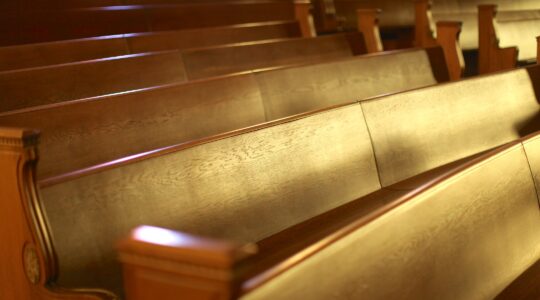“Thank G-d your agency is here to do this work. Thank G-d also that it doesn’t happen in my congregation.”
These are the words of a rabbi with whom I recently had the opportunity to discuss my work as Director of Outreach / Education at JCADA – The Jewish Coalition Against Domestic Abuse. Given the statistics indicating that 15-25% of all relationships experience domestic abuse, his statement is simply not possible. Domestic abuse impacts all sectors of the Jewish community, as it impacts ALL communities. For too long, we in the Jewish community have been in denial that this happens to us. The result is that victims suffer alone, believing they are the only ones.
It is time for us to open our eyes and open our hearts, to see, to hear and to believe.
For any self-identifying cultural community, there are difficulties in admitting that there are issues in that community. This presumption of communal innocence is a barrier to people reaching out for help.
15-25% of all relationships experience domestic abuse.
One of the most complicated issues for victims/survivors of abuse is finding a way to report the abuse to a loved one or other concerned person. Friends and loved ones can play a tremendous role in the prevention, as well as continued perpetration of domestic abuse. Many concerned friends and family find it difficult to intervene because they do not know to whom or what to report, or they feel torn because they don’t want to speak negatively or draw negative attention to the community. If people feel like their community may be disparaged, they may be hesitant to report or seek services because of what others will say about the community.
For too long, we in the Jewish community have been in denial that this happens to us. The result is that victims suffer alone, believing they are the only ones.
Community leaders and clergy can take many steps to empower their communities to raise awareness, and take steps to address the issues. Clergy can speak from the bimah about domestic abuse (see our Clergy Resource Page on our website Parashah Pieces). Synagogues and other gathering places can display bathroom stall signs to direct people to appropriate resources. Links to appropriate communal resources can be included on organization websites (www.jcada.org). Congregations can bring speakers from organizations like JCADA to speak to a variety of groups at the synagogue, and children preparing for b’nai mitzvah can help raise money and awareness.
The right resources, whether they come from inside or outside the Jewish community, are critical.
JCADA is a social service organization that helps men, women, and teens ages 14 and over in the Greater Washington area who experience or witness domestic or dating violence. While JCADA also offers services to non-Jews, 70% percent of JCADA clients either identify as Jewish or have a partner who identifies as Jewish. We deal with not just physical and sexual violence, but also emotional abuse, financial abuse, spiritual abuse, technological abuse, and stalking.
Community leaders need to accept that domestic abuse happens in the Jewish community and that they don’t have the power to control and fix it.
The right resources, whether they come from inside or outside the Jewish community, are critical. JCADA is invaluable because of its sensitivity towards Jewish culture. We offer training for rabbis, clergy members, school officials, or any other adults who work with children to educate them about the necessary steps for how to respond to a disclosure of sexual assault, harassment, or molestation. JCADA aims to bring their trainings to all Greater Washington-area communities, across denominations and settings.
Community leaders need to accept that domestic abuse happens in the Jewish community and that they don’t have the power to control and fix it. Being educated and knowing what resources are available can take pressure off of those who are expected to know everything.
You don’t have to be the judge and jury; you don’t have to be the savior. All you have to do is get someone to resources.
For more information contact JCADA at educate@jcada.org, or call us at 301-315-8040.
Stacy Lang, PhD, LCSW-C, ACSW is JCADA’a Outreach Director, as well as a clinician. She carries a clinical caseload, develops and facilitates community workshops and trainings around issues of domestic abuse.
Posts are contributed by third parties. The opinions and facts in them are presented solely by the authors and JOFA assumes no responsibility for them.
If you’re interested in writing for JOFA’s blog contact shira@jofa.org. For more about JOFA like us on Facebook or visit our website.
The New York Jewish Week brings you the stories behind the headlines, keeping you connected to Jewish life in New York. Help sustain the reporting you trust by donating today.




